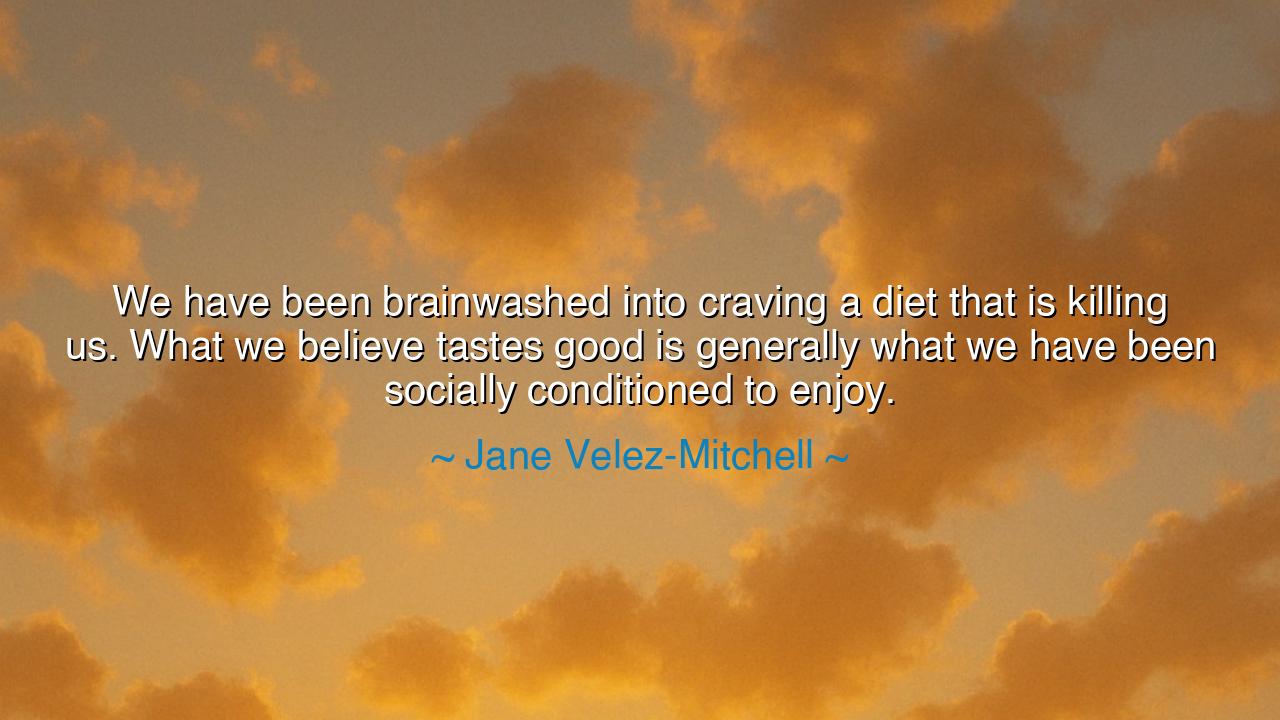
We have been brainwashed into craving a diet that is killing us.
We have been brainwashed into craving a diet that is killing us. What we believe tastes good is generally what we have been socially conditioned to enjoy.






In the words of Jane Velez-Mitchell, the voice of conscience in a world dulled by indulgence, we hear a lament both powerful and prophetic: “We have been brainwashed into craving a diet that is killing us. What we believe tastes good is generally what we have been socially conditioned to enjoy.” These words pierce like a blade through the veil of comfort, exposing the quiet corruption of desire. They are not merely about food, but about illusion, about how civilization itself has trained the human spirit to crave what destroys it, to worship sweetness while drifting toward decay. Her cry is the cry of one who sees beyond the glittering feast—to the sickness it conceals beneath its gold.
In ancient times, sages warned of this same danger, though they did not call it “diet” but corruption of the soul. The great Plato, in his “Republic,” spoke of appetites that grow monstrous when the mind no longer governs them. He said that when men cease to rule their desires, they become slaves to their own pleasures. What Velez-Mitchell calls brainwashing, Plato called forgetting the good—that sacred order where reason and nature once stood in harmony. We, the modern inheritors of abundance, have been lulled into this forgetfulness. The taste we now call delightful is not the voice of instinct, but of industry, whispering in our ear from every glowing screen and wrapper.
There was once a time when humanity ate what the earth provided—fruits still warm from the sun, roots drawn from living soil, water from the spring, and meat from the hunt. Food was sacred, a covenant between body and earth. But now, we consume what is conjured in factories and disguised as nourishment. What once fed life now feeds addiction. Velez-Mitchell’s words remind us that the greatest chains are not made of iron, but of habit—the kind that binds the mind before it binds the flesh.
Consider the story of the Roman Empire, whose citizens once dined like gods. In the height of their wealth, their tables overflowed with sauces and sweets, their banquets stretched until dawn. Yet as their bellies grew full, their hearts grew empty, and the empire that conquered nations could not conquer its own appetites. Historians say Rome fell to barbarians—but perhaps it first fell to gluttony, to the corruption that begins not with the sword, but with the spoon. So too today, our empire of modernity builds towers of sugar and oil, while the body of humanity weakens beneath the weight of its excess.
The conditioning that Velez-Mitchell speaks of is a quiet sorcery. From childhood, we are taught that pleasure lies in the bright, the sweet, the artificial. We are trained not to taste the earth, but to crave the product. The true tragedy is not ignorance—it is deception. For the people do not know they are being led away from health, from balance, from truth. They believe they are free in their choices, when in truth their cravings have been written for them by the hand of commerce.
Yet there is hope, for the human soul is not so easily conquered. Just as the ancients learned to purify the body through fasting, we too may awaken by cleansing our senses of this false sweetness. It begins with awareness—with the courage to question what we have been told tastes good. It begins with returning to simplicity: to the food that grows, not the food that is made; to the meals that nourish, not the ones that numb. To eat consciously is to rebel against the empire of illusion.
The lesson is clear: what you crave reveals what has shaped you. If your hunger leads you to harm, it is not hunger but conditioning. Learn to hunger again for what is true. Choose what strengthens your body and sharpens your mind. Relearn the taste of real food, the rhythm of real hunger, and the joy of real health. The wise do not eat for pleasure alone, but for purpose—for life, for clarity, for harmony.
And so, let Velez-Mitchell’s words be a torch to guide us out of the feast of shadows. The time has come to reclaim our taste, our discipline, our wisdom. Let us unlearn what we were taught to crave, and remember what we were born to need. For the earth still offers us all we require, if only we can silence the voices that sell us poison as delight. To eat rightly is to live rightly, and to live rightly is to rise once more from the ruins of our false desires.






AAdministratorAdministrator
Welcome, honored guests. Please leave a comment, we will respond soon